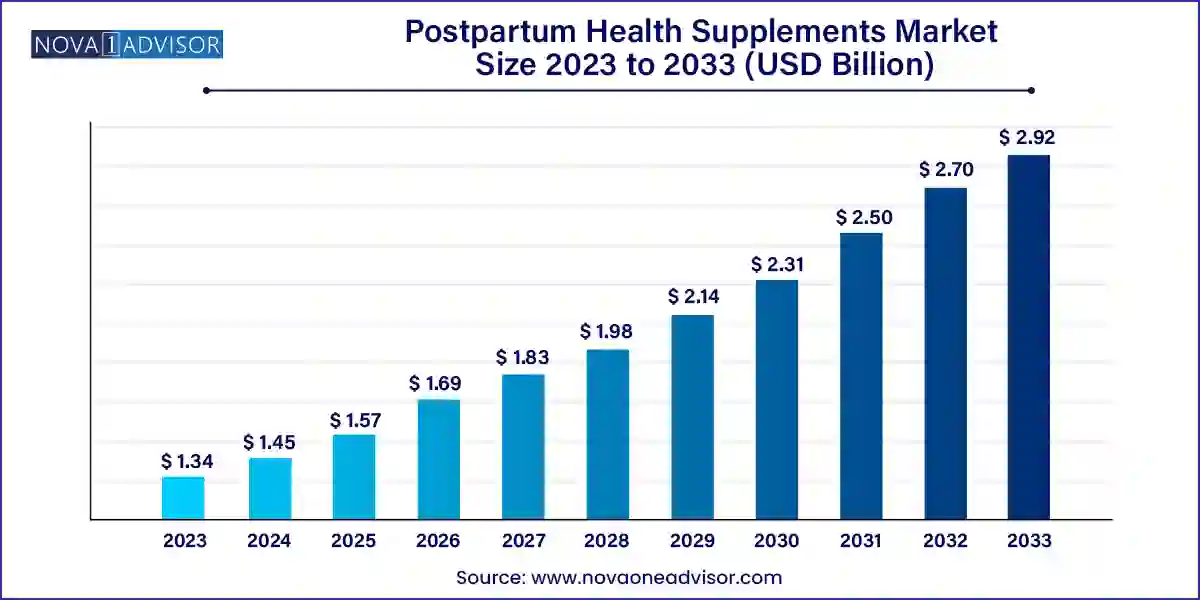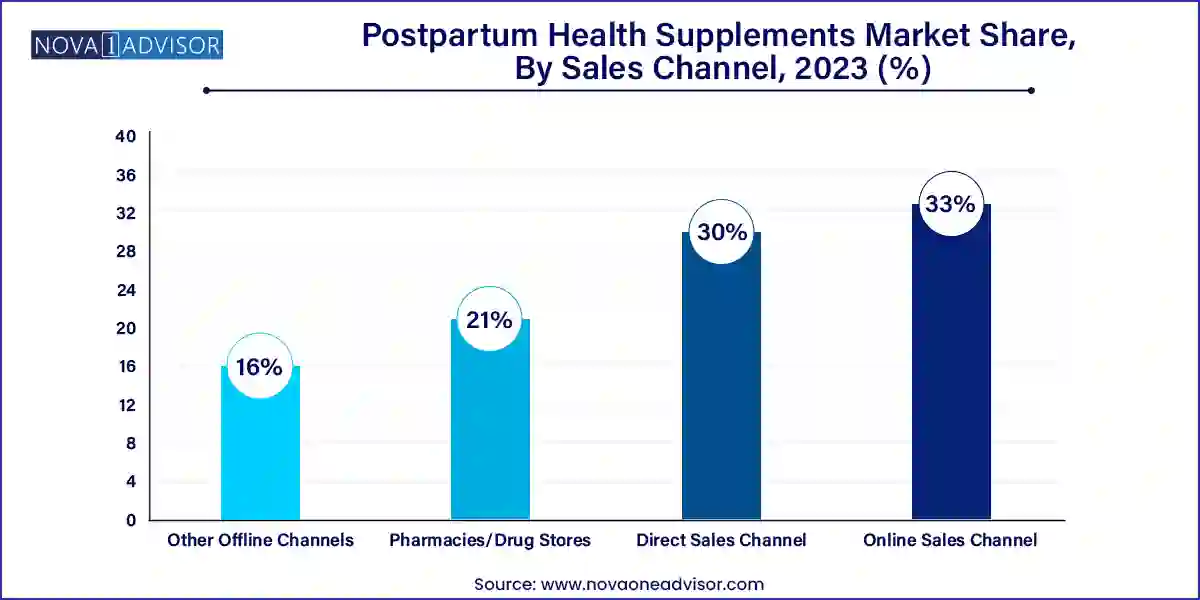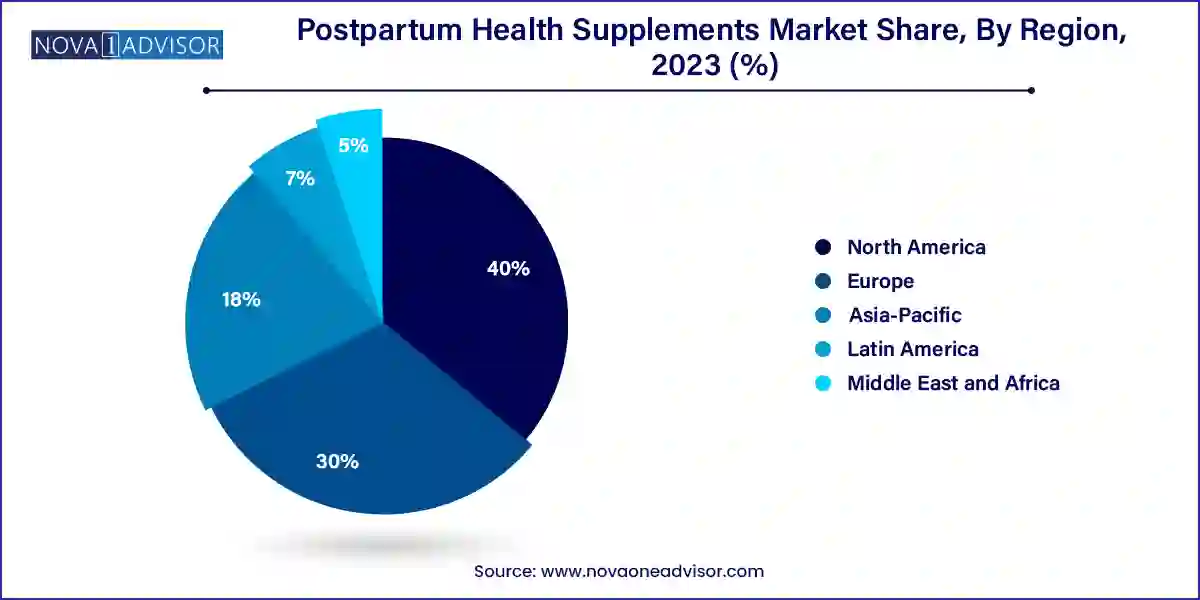The global postpartum health supplements market size was exhibited at USD 1.34 billion in 2023 and is projected to hit around USD 2.92 billion by 2033, growing at a CAGR of 8.11% during the forecast period 2024 to 2033.

Key Takeaways:
- Asia Pacific dominated the market with the revenue share of 40.0% in 2023.
- The MEA region is expected to grow at the fastest CAGR for the forecast period.
- Based on the product, the combined nutritional supplements segment led the market with the largest revenue share of 68.10% in 2023.
- Based on formulations, the capsules/tablets segment held the largest revenue share of 38.3% in 2023.
- The softgels segment is anticipated to witness a significant CAGR during the forecast period.
- Based on sales channel, the pharmacies/drug stores segment led the market with largest revenue share of 33.0% in 2023.
- The online sales channel segment is projected to witness the fastest CAGR over the forecast period.
Market Overview
The Postpartum Health Supplements Market represents a critical intersection of maternal health, nutritional science, and consumer wellness trends. Following childbirth, the maternal body undergoes significant physiological and hormonal changes that can result in fatigue, nutrient depletion, hormonal imbalance, weakened immunity, and mental health challenges such as postpartum depression and anxiety. To address these concerns, postpartum supplements ranging from essential vitamins and minerals to advanced formulations of omega-3s, adaptogens, and probiotics have gained increasing attention among healthcare providers and consumers alike.
Growing awareness around maternal health, increasing disposable incomes, and the normalization of supplementation in daily wellness routines have collectively fueled the demand for postpartum nutritional support. Women are now proactively seeking holistic recovery regimens post-childbirth, supported by gynecologists, nutritionists, and midwives. Social media influencers, digital health platforms, and women-centric brands are also playing a major role in destigmatizing postnatal care and promoting postpartum supplementation.
The postpartum health supplements market is not only evolving in product innovation but also in access and availability. From e-commerce giants to boutique wellness startups, these products are widely available through multiple sales channels, supported by customized subscription models, telehealth consultations, and community-driven digital platforms. As the modern mother becomes more informed and health-conscious, the postpartum supplement space is transitioning from a niche vertical to a mainstream maternal wellness segment.
Major Trends in the Market
-
Personalized Supplementation and Subscription Models: Increasing demand for personalized supplement kits tailored to individual deficiencies and health conditions, often delivered through monthly subscription boxes.
-
Rise in Herbal and Plant-Based Formulations: A shift towards organic, non-GMO, vegan, and herbal ingredients as consumers seek clean-label and natural recovery options.
-
Increased Focus on Gut Health and Mental Wellness: Probiotics and adaptogenic blends designed to support digestion and hormonal balance are becoming more popular, especially those addressing postpartum depression.
-
Digitally Native Brands and E-commerce Dominance: D2C (Direct-to-Consumer) brands are leveraging social media and influencer marketing to promote postpartum wellness products and foster online communities.
-
Integration of Nutraceuticals and Functional Foods: Supplements are increasingly being offered in functional formats like lactation cookies, smoothies, and drink mixes that appeal to convenience-driven consumers.
-
Globalization of Traditional Postpartum Practices: Ingredients like ashwagandha, fenugreek, turmeric, and black sesame are gaining popularity in Western markets, inspired by Eastern postnatal care traditions.
-
Healthcare Professional Endorsements: Growing alignment with OB-GYNs and doulas for supplement recommendations as part of an integrated postpartum care plan.
Report Scope of The Postpartum Health Supplements Market
| Report Coverage |
Details |
| Market Size in 2024 |
USD 1.45 Billion |
| Market Size by 2033 |
USD 2.92 Billion |
| Growth Rate From 2024 to 2033 |
CAGR of 8.11% |
| Base Year |
2023 |
| Forecast Period |
2024-2033 |
| Segments Covered |
Product Type, Formulation, Sales Channel, Region |
| Market Analysis (Terms Used) |
Value (US$ Million/Billion) or (Volume/Units) |
| Regional Scope |
North America; Europe; Asia Pacific; Central and South America; the Middle East and Africa |
| Key Companies Profiled |
New Chapter, Inc.; Mama's Select; ACTIF USA; Nutraceutical Wellness Inc.; Anya; DSM; Pink Stork; Mommy’s Bliss, Inc.; The Honest Company, Inc.; Nordic Naturals |
Postpartum Health Supplements Market By Product Type Insights
Single nutritional supplements dominate the product landscape, with a wide range of specific ingredients targeting individual deficiencies that are common in the postpartum phase. Vitamins such as B-complex, Vitamin D, and Vitamin E are especially important in managing mood swings, energy levels, and hormonal imbalances. Minerals like iron and calcium address postpartum anemia and bone health. Probiotics support gut health and immunity, while herbal supplements like shatavari, fenugreek, and moringa help in lactation and hormonal regulation. The availability of these supplements as standalone products provides flexibility and ease of integration into daily routines, catering to women seeking specific health outcomes.
Combined nutritional supplements are the fastest-growing category, as modern consumers increasingly prefer all-in-one solutions that reduce the burden of multiple pills. These comprehensive blends often include a cocktail of essential vitamins, omega-3 fatty acids, herbal adaptogens, and digestive enzymes, targeting a broad spectrum of postpartum needs from energy and immunity to hair and skin health. The growing popularity of once-a-day postpartum multivitamin formulas and proprietary blends tailored to specific recovery phases (e.g., "Month 1 Recovery" or "Postpartum Energy Boost") reflects this trend. Convenience, value for money, and holistic support are the primary drivers of this segment’s growth.
Postpartum Health Supplements Market By Formulation Insights
Capsules and tablets continue to dominate the formulation segment, owing to their stability, precise dosage control, and wide availability. These forms are commonly preferred by healthcare professionals and are easily integrated into daily routines. Brands like Ritual and Nature Made have capitalized on this with simple, transparent labeling and time-released formulations that promise better absorption and reduced gastrointestinal discomfort. In addition, extended shelf life and ease of packaging and shipping make capsules and tablets ideal for mass distribution through online and retail channels.
Softgels and liquid formulations are the fastest-growing forms, driven by rising consumer demand for easier-to-swallow, faster-absorbing alternatives. Softgels, often used for oil-based nutrients like omega-3s and vitamin D3, offer superior bioavailability. Liquid supplements are gaining popularity among women facing difficulty with digestion or nausea—a common postpartum symptom. Furthermore, innovative delivery forms like tinctures, powders that can be added to lactation smoothies, and dissolvable strips are beginning to enter the market, appealing to tech-savvy and convenience-focused mothers.
Postpartum Health Supplements Market By Sales Channel Insights
Pharmacies and drug stores remain the leading distribution channel, particularly in countries with robust pharmaceutical infrastructure like the United States, Germany, and Japan. Many new mothers prefer trusted local pharmacies for postpartum purchases, where they can receive recommendations directly from healthcare professionals. Pharmacies also typically stock physician-recommended brands, ensuring quality assurance. As postpartum care often overlaps with prescribed medications (e.g., iron supplements or calcium post C-section), pharmacies offer a reliable point of access.

Online sales channels are growing the fastest, revolutionizing how postpartum supplements are bought and consumed. E-commerce platforms like Amazon, iHerb, and niche wellness stores have made it possible for new mothers especially those with limited mobility or time to purchase supplements from the comfort of their homes. Subscription-based models and targeted digital marketing (e.g., Instagram ads for “postpartum vitality packs”) are further fueling this trend. Additionally, many digitally native brands are leveraging influencer partnerships and mom-blogger communities to foster trust and visibility online.
Postpartum Health Supplements Market By Regional Insights
North America leads the postpartum health supplements market, driven by a combination of high awareness, a well-developed healthcare system, and consumer readiness to invest in wellness products. In the U.S., postpartum support is increasingly incorporated into both private and public health discourse, with postpartum depression screening and nutrition becoming part of OB-GYN protocols. Major players like Garden of Life, MegaFood, and Pink Stork offer region-specific formulations that cater to varied cultural and dietary preferences. Furthermore, insurance coverage, postnatal care guidance, and wide availability of premium supplements via both retail and online platforms contribute to the region’s dominance.

Asia-Pacific is the fastest-growing region, fueled by cultural emphasis on postpartum care ("zuo yuezi" in China or "sanhujori" in Korea), growing middle-class incomes, and the entry of global supplement brands. Traditional medicine systems in countries like India, China, and Japan have long emphasized postnatal recovery using herbs and functional foods. Modern supplement brands are now blending this heritage with clinical innovation to appeal to younger generations. For example, companies in India are combining ayurvedic herbs with Western nutrients to create hybrid supplements. Rising maternal health awareness, digital access, and e-commerce growth make APAC an exciting market frontier.
Recent Developments
-
Pink Stork (January 2025): The Florida-based brand launched a new line of hormone-balancing supplements for postpartum mothers, including adaptogenic blends with ashwagandha and maca root, promoted via TikTok and YouTube.
-
MegaFood (February 2025): Introduced a pre- and postnatal nutrition tracker app in partnership with OB-GYN networks in the U.S. to personalize supplement plans based on recovery stage and dietary intake.
-
Himalaya Wellness (March 2025): Expanded its postpartum product range in Southeast Asia, launching moringa and fenugreek-based lactation tablets targeted at working mothers returning to work.
-
Ritual (November 2024): Launched a new vegan postpartum multivitamin with traceable sourcing and carbon-neutral shipping options to enhance appeal among eco-conscious mothers.
Some of the prominent players in the Postpartum health supplements market include:
- New Chapter, Inc.
- Mama's Select
- ACTIF USA
- Nutraceutical Wellness Inc.
- Anya
- DSM
- Pink Stork
- Mommy’s Bliss, Inc.
- The Honest Company, Inc.
- Nordic Naturals
Segments Covered in the Report
This report forecasts revenue growth at global, regional, and country levels and provides an analysis of the latest industry trends in each of the sub-segments from 2021 to 2033. For this study, Nova one advisor, Inc. has segmented the global postpartum health supplements market.
Product Type
- Single Nutritional Supplements
-
- Vitamins
- Minerals
- Herbal Supplements
- Proteins
- Omega-3
- Probiotics
- Others
- Combined Nutritional Supplements
Formulation
- Capsules/Tablets
- Softgels
- Powder
- Liquid
- Others
Sales Channel
- Online Sales Channel
- Direct Sales Channel
- Pharmacies/Drug Stores
- Other Offline Channels
By Region
- North America
- Europe
- Asia-Pacific
- Latin America
- Middle East & Africa (MEA)



